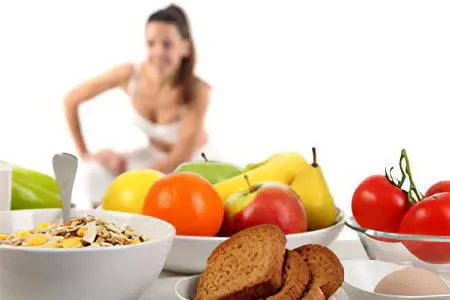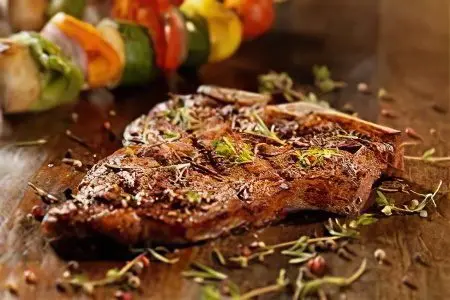Contents

A diet for irritable bowel syndrome must necessarily be aimed at normalizing the digestive process and eliminating existing problems with the gastrointestinal tract. It must be adhered to for at least three months, most often during this time it is possible to put the body in order.
The essence of nutrition in irritable bowel syndrome is to ensure that a person receives good nutrition and at the same time has the opportunity to reduce the negative symptoms of the existing pathology. It is important to highlight those foods that stimulate the onset of discomfort, provoke constipation, diarrhea or bloating. Such food should be eliminated from the diet. This is especially true in the presence of intolerance to milk sugar and gluten.
The diet for irritable bowel syndrome is divided into 2 types, depending on the main symptom:
When diarrhea predominates, you should cook food properly, it is best to grind it. You need to focus only on the allowed list of products. Experts with diarrhea recommend taking dietary table No. 4 as a standard of nutrition. It helps to strengthen the motor function of irritable bowel, reduce the urge to defecate.
If a person suffers from constipation, then it is also important to review the diet, include foods that stimulate the intestines. In this case, experts recommend referring to the Pevzner dietary table No. 3.
Do not give up dietary nutrition if it is recommended by a specialist. From any proposed list of products, you can cook a lot of interesting dishes, which, moreover, will have a therapeutic effect and improve the quality of life of a person with irritable bowel syndrome.
Diet #3 according to Pevzneru
Diet No. 3 according to Pevzner is aimed at eliminating and preventing constipation, if such symptoms prevail in irritable bowel syndrome in a patient. In addition, by adhering to the proposed diet and eliminating forbidden foods from your menu, you can ensure that the pain caused by increased gas formation in the intestines will be completely eliminated. After all, doctors recommend sticking to the table under number 3 for people with flatulence. (read also: Types and causes of flatulence)
By including allowed products in the menu, it will be possible to gently stimulate the work of the intestines, speed up the process of its natural emptying.
Diet No. 3 does not imply a person’s calorie restriction, it must correspond to his body weight and age requirements. The number of kilocalories varies from 2900 to 3600. In this case, carbohydrate food should prevail – up to 450 g of carbohydrates per day.
Following all the recommendations, you can get the following effect:
Regulate the process of digestion.
Activate the absorption capacity of the stomach.
Increase the production of digestive enzymes.
Increase intestinal motility.
Achieve painless and regular bowel movements.
Diet No. 3 according to Pevzner is a complete nutritional scheme that is rich in foods with coarse vegetable fiber, which stimulate intestinal motility.
Allowed diet products No. 3 according to Pevzner
Allowed diet products No. 3 according to Pevzner are included in the following list:
Vegetables: pumpkin, tomatoes, beets, cauliflower, cucumbers, zucchini, carrots. In boiled form, you can white cabbage and green peas.
Fermented milk products in the absence of individual intolerance: low-fat sour cream, yogurt, cottage cheese, regardless of its calorie content, yogurt, not spicy cheese, cream, fermented baked milk. Milk and drinks based on it.
Cereals: buckwheat, yachka, millet, pearl barley. It is advisable to cook them in the form of crumbly cereals.
Boiled eggs, soft-boiled, in the form of a steamed omelet, but no more than 2 pieces per day.
Lean meat, lean fish, dairy sausages. Meat products are best boiled in lumps, sometimes minced meat can be used.
Seafood: shrimp, squid, mussels.
Not rich pastries, yesterday’s bread. Bread can be rye, bran, wheat.
Soups are best cooked on a vegetable broth. It can be beetroot, okroshka, cabbage soup, borscht.
Offal, aspic, jelly.
Sea Kale
Sweet fruits, berries: pineapple, oranges, bananas, grapes, blueberries, melon, kiwi, strawberries, cranberries, lemons, raspberries, tangerines, papaya, rhubarb, blueberries.
Homemade jam, purchased marmalade without emulsifiers and artificial colors, any kind of honey.
Decoction of wheat bran.
Dill, celery, parsley, bay leaf as seasonings. Sauces can be made on a tomato and sour cream base, or on a weak fish or meat broth.
From fats, it is allowed to add vegetable oils to dishes, you can include butter and soft margarine in food.
Nuts: all except pistachios, peanuts and cashews, but in small quantities, sunflower seeds and pumpkins;
Tea black and green, decoctions of herbs, fruit, compotes. In addition, almond, oat, soy, rice milk are allowed.
Sugar-containing foods: glucose, maple syrup, stevia, sugar (limited), chocolate (dark and milk)
Prohibited Products

Although Diet No. 3 according to Pevzner suggests completely excluding the following prohibited foods from the menu:
Butter dough, puff pastry, bread made from premium flour.
Fatty meat, goose and duck are prohibited from poultry. Semi-finished products, refined products.
Smoked and any canned foods (including fruits).
Salted and smoked fish, as well as fatty fish.
Eggs cooked in the form of scrambled eggs.
From cereals, semolina, vermicelli, legumes, wheat, rye, barley fall under the ban;
Dairy products: soft cheeses, as well as all dairy products, except those that do not contain lactose.
Pasta.
From vegetables should not be included in the menu: turnips, onions, garlic, radishes, radishes, mushrooms. Potatoes should be limited.
As desserts, you should not use any products containing creams, as well as jelly.
Fruits and berries should not be consumed: apricots, watermelons, cherries, pomegranates, grapefruit, pears, mangoes, nectarines, peaches, plums, persimmons, cherries, apples.
Sweeteners: corn syrup, honey, sugar alcohols (xylitol, maltitol, sorbitol), agave syrup, fructose.
Sauces can not be fatty, spicy, based on mustard.
From drinks, strongly brewed tea (including chamomile tea), coffee and cocoa, whey, alcohol, fruit juices are banned.
Prohibited fats such as beef, lamb and all cooking fats.
Nuts (peanuts, cashews, pistachios), dried fruits, canned fruits;
| Breakfast | Snack | Dinner | Snack | Dinner |
First option | Steamed omelet. Cauliflower salad with vegetable oil. Green tea. | Permitted fruits | Borsch with sour cream. Meat with cabbage stew. Compote. | Ryazhenka | Cabbage rolls with minced meat. Buckwheat with cottage cheese in the form of krupenik. Black weak tea. |
The second option | Millet porridge with milk. Pear. Rosehip decoction. | Permitted fruits | Hake ear. Salad with tomatoes, carrots and cucumber in vegetable oil. Boiled meat. | Zucchini caviar, cheese, bread. Kefir. | Minced meat meatballs with tomato sauce. The vinaigrette. Rosehip decoction. |
Diet №4
The priority task of diet number 4 is to provide good nutrition to a person suffering from diarrhea. It is this condition that often accompanies irritable bowel syndrome, so doctors often recommend table number 4 as an addition to the main treatment. By adhering to the existing recommendations, it will be possible to reduce inflammation, prevent the development of putrefactive and fermentation processes in the intestines, normalize its work, and bring the functioning of all organs of the gastrointestinal tract back to normal.
Diet No. 4 involves a slight reduction in caloric intake, which is ensured by reducing carbohydrates and fats entering the body, while the amount of protein remains unchanged. It is necessary to exclude as much as possible all chemical, mechanical and thermal effects on the irritated organ. Remove products that can stimulate the secretory function of the digestive system.
Dishes are boiled or steamed. Their consistency is liquid, semi-liquid or rubbed. It is important not to eat food that is too hot or too cold. Salt is consumed per day no more than 10 g, calorie content should not exceed 1700 kcal. It is important to adhere to the principle of fractional nutrition and eat at least 5 times a day, but in small portions.
Allowed Diet Foods #4

From flour products, crackers made exclusively from premium wheat bread are allowed. It is important that they do not have a fried crust, and the volume does not exceed more than 200 g per day.
Soups are cooked in a second meat or fish broth. That is, after boiling, the water drains.
Of the cereals allowed: buckwheat, corn, oatmeal, millet, rice, sago, sorghum, gluten-free pastries. If the cereal is cooked in the idea of porridge, then milk should not be added to it during cooking. Cooking exclusively on water.
The meat is lean, in the form of dumplings or meatballs. You can use lean beef, chicken, turkey, rabbit, veal. The skin must be removed from poultry meat.
The fish is lean, cooked either in pieces or in chopped form.
From dairy products unleavened cottage cheese is allowed.
You can eat no more than 1 egg per day. The correctness of its preparation is important: either soft-boiled, or steamed, or in the form of egg flakes in soup.
Vegetables are not eaten, you can only cook broths on them.
For dessert, kissels and jelly are prepared from quince, pears, bird cherry, blueberries, dogwood. Sugar added is limited.
Butter is used as a dressing for dishes, the sauce is low-fat broth. The amount of oil per serving should not exceed 1 g.
From drinks allowed green tea. You can cook decoctions of blackcurrant, wild rose, quince.
Prohibited Products
All bakery products, except dried wheat bread. All pastries and other flour products are prohibited.
You can not soups on strong fish and meat broths, with cereals, milk soups.
Whole milk and other dairy products are excluded.
Forbidden fish: fatty, fried, salted, canned. You can not caviar and seafood.
You can not fatty meat – pork and beef, goose and duck. You can not lumpy, especially sinewy meat. Offal and semi-finished meat products are prohibited.
You can not raw eggs, hard-boiled eggs, scrambled eggs.
Of the cereals under the ban falls: cells, millet, pearl barley, all legumes. No pasta.
You can not any sauces, mayonnaise, mustard, tomato and sour cream sauces.
Dried fruits, fruits without pre-treatment, berries are prohibited.
You can not jam and honey, as they have a laxative effect. Do not use confectionery as a dessert.
Cocoa and coffee with milk, compotes, any carbonated drinks are prohibited.
Any oils and fats are prohibited, except for fresh butter in limited quantities.
| Breakfast | Lunch | Dinner | Afternoon snack | Dinner |
First option | Oatmeal on the water. Green tea. | Permitted fruits | Meat broth with oatmeal. Steam quenelles, rice on the water. Black tea with sugar. | Kissel from blackcurrant. | Steam cutlets from hake. Pureed buckwheat porridge with butter. Rosehip decoction. |
The second option | Buckwheat on the water. Cocoa without milk with sugar. | Permitted fruits | Chicken broth with rice. Boiled rabbit meat with pureed buckwheat porridge. Pear jelly. Black tea with sugar. | Rusk with oatmeal. | Steamed pollock quenelles, poached egg. Cottage cheese casserole. Green tea. |









